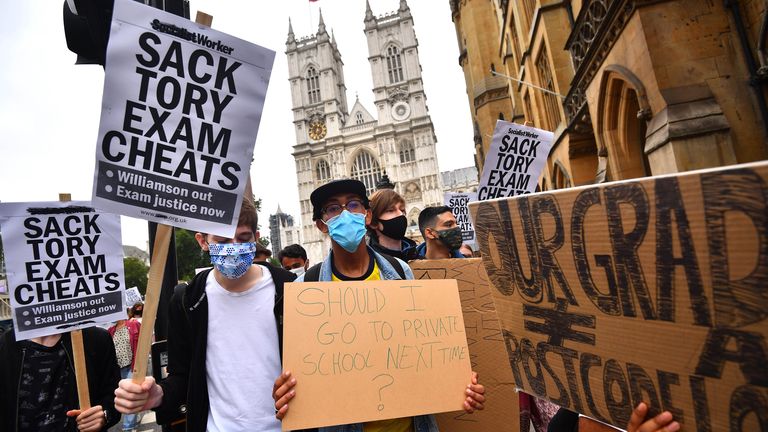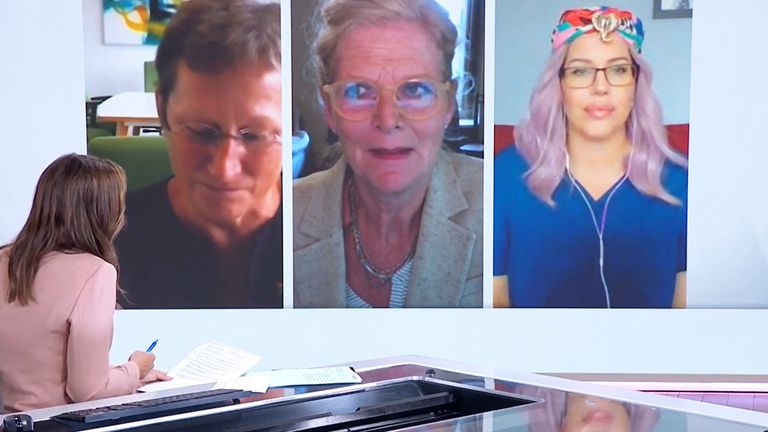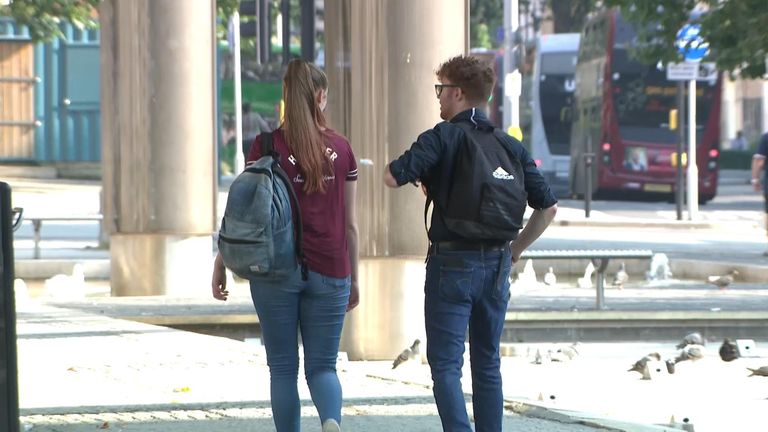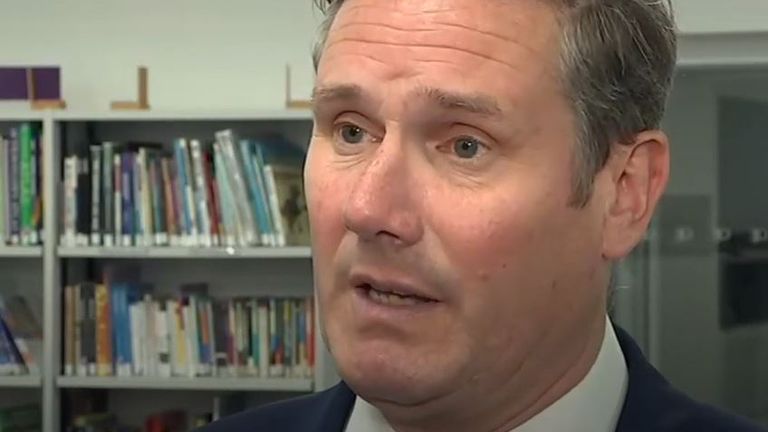Labour is demanding ministers ditch a controversial algorithm and use predicted grades from pupils’ teachers for A-level results in England.
The party’s deputy leader Angela Rayner told Sky News that the algorithm was “flawed” and has “baked in inequalities”.
Thousands of teenagers have voiced anger and disappointment after having their marks downgraded.
A protest involving students, parents and teachers took place on Friday, as the government comes under pressure to change course.
A group of demonstrators marched down Whitehall towards the Department for Education.
Around 100 protesters gathered outside Downing Street, chanting “sack Gavin Williamson” and “teachers not Tories”.
Almost 40% of teachers’ estimates were adjusted down by one grade or more, which amounts to around 280,000 entries.
A total of 35.6% of marks were adjusted down by one grade, 3.3% were brought down by two, and 0.2% came down by three.
With exams cancelled because of the coronavirus pandemic, schools and colleges were required to submit the grades they thought each pupil would have got had they sat the papers as normal.
These grades were then moderated by exam boards to make sure the results were not significantly higher than in previous years.
After this standardisation process, the proportion of entries awarded top grades still rose to an all-time high, with 27.9% securing an A or above in England, Wales and Northern Ireland.
:: Listen to the Daily podcast on Apple Podcasts, Google Podcasts, Spotify, Spreaker
But school leaders said there was a “great deal of volatility” in results at individual schools and colleges, with some reporting more than half of their grades had been adjusted down.
Private schools seem to have benefited most from the changes, fuelling claims the system is disadvantaging pupils from poorer backgrounds.
Exams watchdog Ofqual said there is no evidence of bias against pupils based on their socioeconomic status and that moderating was needed given “generous” initial assessments that predicted “implausibly” high grades in some schools.
Speaking to Sky News, Ms Rayner called on the government to follow the example of Scotland and scrap the moderated grades.
“In Scotland they’ve done a U-turn and gone to the teacher assessment now,” she said.
“Because they recognised that whilst that’s not perfect, it’s certainly a lot better than this flawed algorithm which has baked in inequalities for a lot of students.
“It basically goes off the history of the school and the geographical area, rather than the ability of the child.
“So it penalises children in effect on where they live or which school [they go to] and the history of that school.”
Labour leader Sir Keir Starmer has called for all fees for A-level appeals to be waived.
He said: “Across the last 24 hours we have heard heartbreaking stories and the scale of the injustice caused by the fatally flawed results system has become clear.
“The unprecedented and chaotic circumstances created by the UK government’s mishandling of education during recent months mean that a return to teacher assessments is now the best option available.
“No young person should be at a detriment due to government incompetence.
“Time is running out. We need action in days, not weeks. We need to end this fiasco.”
Education unions, including the National Union of Students, are also calling on the government to use teachers’ predicted grades.
And some Conservative MPs have voiced concerns, with Telford MP Lucy Allan describing the algorithm as “fundamentally flawed”.
Rother Valley MP Alexander Stafford said he was “very concerned” about reports of results being downgraded across his constituency and he would be contacting Education Secretary Gavin Williamson.
But Prime Minister Boris Johnson has defended the system, saying the marks are “robust” and “dependable”.
“Looking at the big picture, I think overall we’ve got a very robust set of grades,” he said.
“Plus you’ve got the situation in which more pupils than ever before are getting their first choice course at university and more kids from disadvantaged backgrounds going to university.”
The PM added: “It’s very important that for years to come people should be able to look at these grades and think these are robust, these are dependable.”
Earlier this week, the government announced that students would be able to use their mock exam results to appeal if they were unhappy with their grades, as well as being able to sit exams in the autumn.






